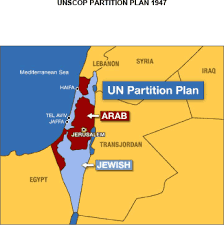U.S. Seeks Big Vote for Split in Palestine, Associated Press, NY Sun, Nov. 11, 1947
 “With all its imperfections, the partition plan offers the most practicable solution of the Palestine problem.” – Herschel V. Johnson, U.S. delegate to the U.N.
“With all its imperfections, the partition plan offers the most practicable solution of the Palestine problem.” – Herschel V. Johnson, U.S. delegate to the U.N.
Makes Direct Plea For Large Majority In U. N. Committee
Lake Success, N. Y., Nov. 22 (AP). The United States today appealed for United Nations approval of the proposal to partition Palestine into Jewish and Arab countries “by as large a majority as possible.”
It was the first time in the lengthy United Nations debate on the Holy Land that the United States made a direct plea for votes for partition, which is bitterly opposed by the Arabs and supported by the Jews. Herschel V. Johnson, United States delegate, made the statement before the 57-nation Palestine committee, which is discussing the only issue left on the calendar of the 1947 General Assembly.
“The plan of partition with economic union carries sufficient flexibility to be made workable,” Johnson said. “We hope it is adopted by as large a majority as possible.
Most Practical Solution
“With all its imperfections, the partition plan offers the most practicable solution of the Palestine problem.”
Johnson thus took issue with Sir Carl Berendsen, of New Zealand, who declared that the partition plan is “deplorable” because there is no provision for a police force to make effective the creation of the contemplated Jewish and Arab countries.
Dr. Mohamed Fadhil Jamali, Foreign Minister of Iraq, said Johnson’s speech “baffled” him and argued that the partition plan violated the United Nations Charter. Asking that the Assembly “shall not be influenced to make unjust decisions,” he declared-
“The Jewish Agency determined the partition plan. The United States accepts the generous gift of the Jewish Agency.”
Political Upheaval
Terming the partition proposal “an adventurous plan launched by dreamers,” he said it would “immediately lead to bloodshed and immediately create a political upheaval.”
Britain’s John Martin objected to Johnson’s reference to the “desultory assistance” of the British before a subcommittee, which worked out the partition plan. Again emphasizing that his Government could not assume responsibility for enforcing partition, Martin said-
“If there is fighting in Palestine, the soldiers there will be British. If lives are lost, they will be British. If there are widows and orphans, they will be British.”
Adjournment Delayed
A decision on Palestine held up final adjournment of the turbulent ten-week Assembly session, in which the highlights were Russia’s boycott against three new organs created at the suggestion of Gen. George C. Marshall, Secretary of State.
Debate on Palestine was slated to continue through the week end with 22 speakers on the list late today.
The afternoon meeting was adjourned after Iraq. Yemen, Syria and Pakistan spoke against partition and Bolivia supported it. New Zealand indicated she would abstain and China that she would back the split-up scheme.
Partition Held Only Hope
The Palestine committee has before it conflicting proposals calling for partition of the Holy Land into independent Jewish and Arab nations or the establishment of a single independent Arab country.
Only partition, supported by the United States and Russia, was given a chance for approval in the pre-vote speculation of delegates. In the committee, proposals need a majority of the 57 delegates present and voting. For the final ballot on the Assembly floor, rules require approval by two thirds of those present and voting.
The Arabs remained confident they could block partition, but if they fail Dr. Jamali told the committee that the Arabs will “fight against the imposition” of the split-up plan.
The Soviet boycott, which includes Russia, White Russia, the Soviet Ukraine, Poland, Czechoslovakia and Yugoslavia, covered the year-around “Little Assembly,” the Balkan border commission and the Korean commission.
New Bodies Held Illegal
These three key American proposals, advanced by Marshall personally in his opening policy speech to the Assembly last September, were accepted overwhelmingly in the face of Soviet opposition based on contentions that the new bodies were “illegal” and contrary to the Charter. In each case the Soviet countries announced they would neither participate nor co-operate with the groups.
The futility of attempting to force any change in the Russian attitude on vetoing membership requests was illustrated today when the Council met briefly to comply with Assembly instructions to look over Italy and Trans-Jordan again immediately.
Attitude Unchanged
Russia had vetoed these two along with Finland, Ireland, Austria and Portugal and Andrei A. Gromyko. Deputy Foreign Minister, told the eleven-nation Council that Moscow’s attitude was “unchanged.”
The United States suffered a setback in its attempts to block the election of the Ukraine to Poland’s expiring seat on the Council. After a series of deadlocked ballots. India withdrew from the race. This resulted in the Ukraine’s election to a two-year term. The lineup after the Council’s January 1 change will alter little, as Poland consistently votes with Russia in the familiar 9-to-0 ballots. Canada will replace Australia, and Argentina won Brazil’s seat.
To Meet In Europe
In another major decision, the Assembly voted to hold its 1948 meeting somewhere in Europe. A nine-nation committee will consult with Trygve Lie, secretary general to select the site for the temporary switch, with Paris, Geneva and Brussels considered the leading candidates. Lie will head a party of United Nations officials visiting Europe in January to consider the next meeting place.
There was a possibility that the proposed skyscraper site in Manhattan, designed as permanent headquarters for the United Nations, would be ready in time for the 1949 meeting. The Assembly voted to accept the American offer to Joan $65,000,000 to the peace agency for construction of the headquarters.



